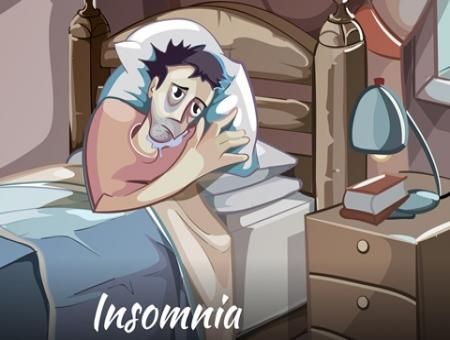Here's What Insomnia Can Lead To!
By Dr. Prashant Gupta in Mental Health And Behavioural Sciences
Nov 28 , 2020 | 5 min read
Your Clap has been added.
Thanks for your consideration
Share
Share Link has been copied to the clipboard.
Here is the link https://www.maxhealthcare.in/blogs/here%27s-what-insomnia-can-lead-to!
Insomnia is a sleep disorder where a person has trouble sleeping or staying asleep as long as desired. It is also known as sleeplessness and can be caused by a host of psychiatric and medical conditions. Insomnia is often triggered by unhealthy sleep habits, specific substances like caffeine or psychoactive drugs or certain biological factors.
People with insomnia can feel displeased with their sleep and often experience several symptoms that can make them even more dissatisfied with their everyday life. Dr. Prashant Gupta, Consultant, Mental Health and Behavioral Sciences, Max Super Speciality Hospital, Patparganj says, below are some of the symptoms that a patient suffering from insomnia often experiences –
- Fatigue
- Low Energy
- Mood Disturbances
- Difficulty Concentrating
- Decreased Performance at work
Insomnia is often characterized by its duration and how long it lasts and can be classified into two categories viz. Acute and Chronic Insomnia.
Acute Insomnia is brief and often happens at a time when there are certain life circumstances like a night before an important exam or after receiving shattering news. Almost all people have experienced acute insomnia at least once in their life. It is directly related to stress, and the sleep is often of inferior quality.
Chronic Insomnia, on the other hand, is disrupted sleep that occurs at least three nights in a week and can last up to a period of three months. It can be caused by a range of reasons including and not limited to unhealthy sleep habits, shift work, certain medications, and clinical disorders. Chronic insomnia sometimes can be a comorbid condition, that is, it can be linked with other medical or psychiatric issues. However, it can be difficult to draw a line between the cause and effect relationship. If you are suffering from chronic insomnia, it is imperative to visit a Psychiatrist. Max Hospitals have a good Psychiatry department and their Psychiatrists are equipped to treat the most adverse cases of insomnia.
Most people suffering from chronic insomnia often worry about not sleeping enough, and this can negatively impact their condition. If you are among those people who constantly worry about your insomnia, here are some solutions that can aid you –
Spend Less Time in Bed
Our brains are wired in certain ways, and we regularly take cues from our daily life when it comes to adopting some standard practices. The brain is wired to relate sleep with bed, and when we spend more time in bed (not sleeping), we invariably make our brain think that it is in the state of sleep. People suffering from insomnia should try and consolidate their sleep by shortening the time spent in bed. Devote more time outdoors, or in the living room and go to the bed when it is nap time.
Stop Worrying
Constantly worrying does more harm than good. It is a response to our brain in crisis and must be avoided. However, if you find yourself worrying all the time, it is time to curb that notion and channelize that energy into doing something productive. Alternatively, you can allocate time when you can worry. Set aside twenty minutes every day before dusk and write down things that you are worried about, or you must accomplish the next day. Make sure you train your brain to follow this set time by indulging in productive activities.
Implement Regular Sleep Hours
Regular sleep pattern is more important than most people suffering from insomnia realize. Make it a point to sleep every day, no matter how less. It is in the best interest for you to set a schedule where you sleep and wake up at the same time. However, if that seems impossible, make sure you follow a rapid eye movement sleep cycle. It is also known as paradoxical sleep and is beneficial in many ways, including learning, creating and retaining memories. Alternatively, you should always try and sleep in cycles of ninety minutes, three hours, and so on. It will help you wake up fresh, and you will feel satisfied with your sleep.
Chronic insomnia and sleep deprivation can lead to serious health problems like –
- Heart Diseases
- High Blood Pressure
- Stroke
- Diabetes
- Heart Failure
- Weight Gain
- Skin Ageing
- Depression
- Impaired Judgement
Mental Health Problems
Chronic Insomnia can be critical if left untreated and can adversely affect the central nervous system. Our brain and the central nervous system cannot work without sleep, and it can disrupt the flow of information within the brain and from the brain to the body. It can also affect the mental state and cause disruption in the emotional well-being. Eventually, if a patient is suffering from sleep deprivation for a long time, it can lead to hallucinations which can become a gateway towards life-threatening illnesses like paranoia and schizophrenia.
Weaken Immune System
Cytokines are produced by the body when we are sleeping, and they are the essential substances that protect our body from infections. It is used by the body to fight microbes such as bacteria and viruses. Chronic insomnia prevents the body from producing cytokines and eventually weaken its defence system. In long-term cases of chronic insomnia, it can lead to diabetes and heart diseases. It can also trigger previous infections and make it difficult for the body to fight foreign bodies.
Cardiovascular System
Sleep is a necessity and a way our body is wired into this process. Skipping sleep can halt critical processes and negatively impact the cardiovascular system. It can give rise to high blood sugar, high blood pressure, and increase inflammation levels exponentially. Since insomnia can lead to the weakened immune system; it hampers the ability of the body to heal blood vessels which can lead to stroke, and heart attack.
Worrying about insomnia can lead to the conditions mentioned above, and can hamper several functions of the body. It becomes imperative for patients to stop worrying about insomnia, and start adopting healthy practices. If you think your condition has worsened over time, it is time to consider a neurologist by visiting the best neuro hospital in India. It is important to get yourself treated and not live in darkness, since, insomnia acts as a catalyst and can increase the risk of life-threatening diseases to a larger extent.

Written and Verified by:
Related Blogs

Dr. Sameer Malhotra In Mental Health And Behavioural Sciences
Nov 07 , 2020 | 7 min read

Dr. Prashant Gupta In Mental Health And Behavioural Sciences , Psychiatry
Nov 08 , 2020 | 5 min read
Blogs by Doctor

Here’s What Insomnia Can Lead To!
Dr. Prashant Gupta In Mental Health And Behavioural Sciences , Psychiatry
Nov 08 , 2020 | 5 min read
Most read Blogs
Get a Call Back
Related Blogs

Dr. Sameer Malhotra In Mental Health And Behavioural Sciences
Nov 07 , 2020 | 7 min read

Dr. Prashant Gupta In Mental Health And Behavioural Sciences , Psychiatry
Nov 08 , 2020 | 5 min read
Blogs by Doctor

Here’s What Insomnia Can Lead To!
Dr. Prashant Gupta In Mental Health And Behavioural Sciences , Psychiatry
Nov 08 , 2020 | 5 min read
Most read Blogs
- CAR T-Cell Therapy
- Chemotherapy
- LVAD
- Robotic Heart Surgery
- Kidney Transplant
- The Da Vinci Xi Robotic System
- Lung Transplant
- Bone Marrow Transplant (BMT)
- HIPEC
- Valvular Heart Surgery
- Coronary Artery Bypass Grafting (CABG)
- Knee Replacement Surgery
- ECMO
- Bariatric Surgery
- Biopsies / FNAC And Catheter Drainages
- Cochlear Implant
- More...




